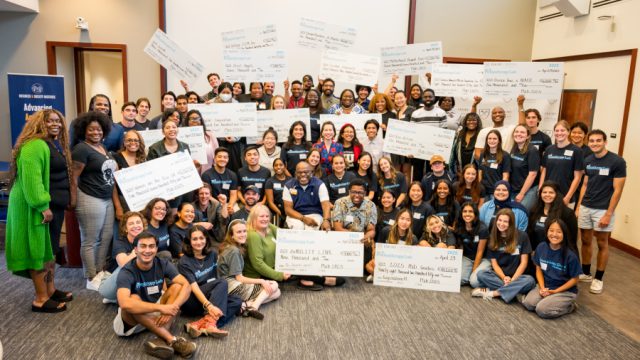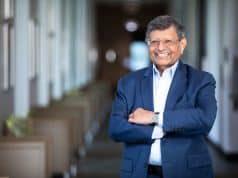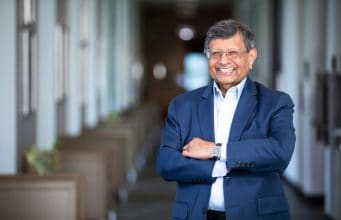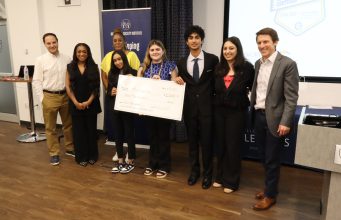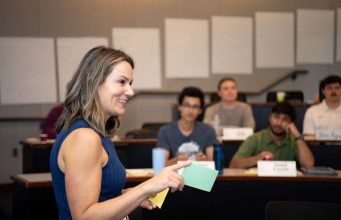At the end of April, Goizueta students, faculty, and staff gathered with community partners for a particularly joyful event. A DJ spun spirited tracks while guests mingled over pupusas and ice cream, casting a celebratory atmosphere over the entire conference room.
Indeed, there was much to celebrate: As the next hour unfolded, students from Goizueta Business School’s Philanthropy Lab course handed over checks totaling nearly $100k to 15 local nonprofit organizations addressing inequity in Atlanta.
How to Give Better
Emory’s Philanthropy Lab course has been running for six years, with this year’s cohort being the largest yet at 48 students. The 2025 edition was co-led by Brian Goebel, managing director of Goizueta’s Business & Society Institute; Tené Traylor, executive director of the Black Wealth Data Center; and Dena Kimball, an Emory alumna, former executive director of the Kendeda Fund, and Goizueta adjunct professor. Their broad cross section of experiences in and around philanthropy gave this dream team an edge in providing well-rounded perspectives to the course.
Emory University is one of 32 schools that operates in partnership with The Philanthropy Lab program. The organization, based in Fort Worth, Texas, aims to expand student interest and participation in philanthropy. Since 2011, the Philanthropy Lab program has invested nearly $17 million in partner schools to facilitate experiential courses on philanthropy. Goizueta’s course is co-supported by several partner organizations. These include the Center for Civic Innovation, the Shapiro Foundation, and United Way of Greater Atlanta, where both Goebel and Traylor started their careers.
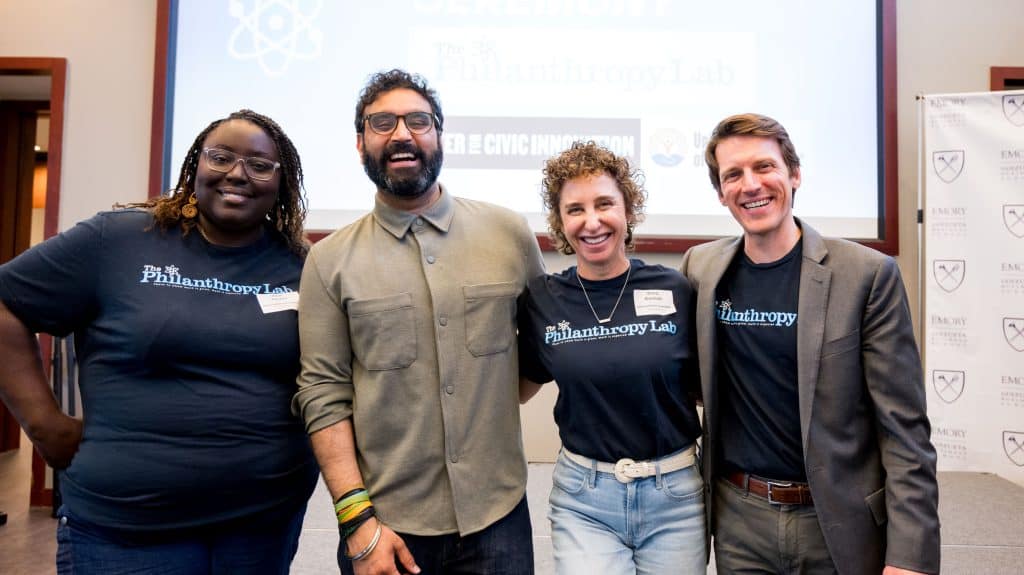
The goal of the course is an ambitious one: In 14 weeks, students form teams, which represent foundations, and craft a foundational philosophy and mission. The mini-foundations develop a rubric from their coursework to determine what makes a non-profit effective. They then review several real Atlanta nonprofits and offer funds to one or two of them.
This project-based format transforms the classroom into a live lab, where students grapple with real-world consequences and complexities of philanthropic decision-making. It also demands a deep dive into the many nuances of nonprofit work and the communities it serves. Course instructors revise the syllabus every summer, ensuring the course materials are timely and relevant to the ever-evolving nonprofit sector.

Guest lecturers and panelists are another powerful learning tool in the course’s arsenal. The class engaged with Emory alumni working across the philanthropic sector like Alvin Glymph 94C of United Way, Jon Goldman 15BBA of the Robin Hood Foundation, Rohit Malhotra 08C of Center for Civic Innovation, Danny Shoy 95C of Arthur M. Blank Family Foundation, and Lara Wagner 16G of Regions Bank. Additionally, the class welcomed experts from local organizations—Nathaniel Smith of Partnership for Southern Equity and Janelle Williams PhD of Kindred Futures—to help students explore the history of inequity in Atlanta and how equity-centered philanthropy can effectively address it.
“When professionals visit our class, it helps us to go beyond theory to practice. Speakers also provide students with valuable insights into the diverse, changemaking career and civic pathways that they can consider for whatever they do next,” says Goebel.

Mini-Foundations with a Big Mission
Students form their mini-foundations after completing a questionnaire to identify their top three impact areas. The course then groups students into teams by shared interests—like Green Givers, who focus on environmentally-related equity disparities, or Culture Catalysts, who amplify youth voices through the arts.
According to Grace Zhang 25BBA, a member of Culture Catalysts, the common thread that brought her team together was their shared passion for arts and human expression. The group also shared a deep belief in philanthropy as a vehicle for relief and societal improvement.
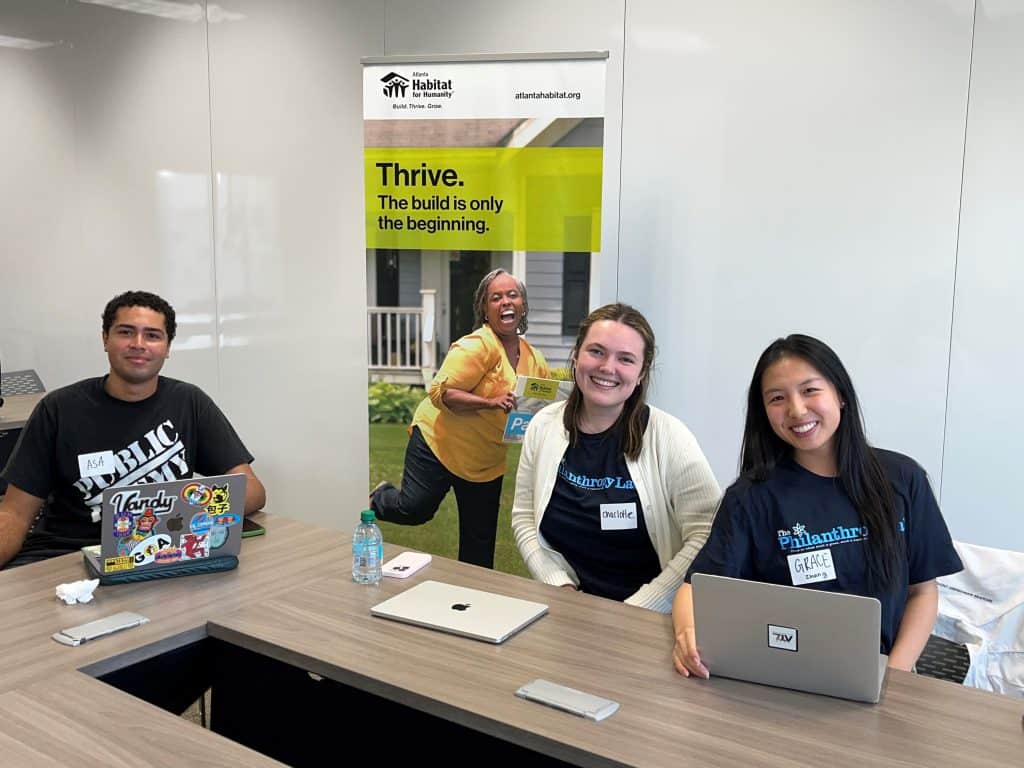
“Beyond arts’ ability to educate and heal, our research revealed that investing in the arts is investing in economic empowerment,” says Zhang. “For example, according to Americans for the Arts, Atlanta’s nonprofit arts and culture sector generates $890 million in economic activity annually and supports 12,719 jobs. Ultimately, we were excited to support organizations like The Aster Project and ChopArt who were using creative approaches to provide healing and justice in Atlanta.”
For Allison Silas 25BBA, her learning felt like a series of “ah-ha” moments—with the importance of the giving philosophy being a big one.
“When my foundation team was first instructed to build our team giving philosophy, none of us took it that seriously,” Silas admits. “We chose some impact areas, found some statistics, and called it a day. As the grantmaking process continued, though, we realized that our original giving philosophy wasn’t working. It was broad, vague, and didn’t really reflect our values or guide our decision-making in a meaningful way. After some advice from our wonderful coach, Dena, we engaged in an honest discussion about our values and priorities, and we were ultimately able to construct a concise and direct giving philosophy that served as a ‘north star’ in guiding our decisions. This experience taught me the importance of digging deep to figure out what truly matters—and backing that up with your actions.”

The fact that philanthropy has a complex, and—at times—questionable history is not lost on any of the course’s stakeholders. When Silas addressed the event attendees with a quote originally provided by Rohit Malhotra—“We don’t need more social impact businesses; we need to put problems out of business.”—her words were met with vociferous approval. The dynamics that create wealth inequality and permit a select group to determine to whom money will be doled out and what strings will be attached to it has caused harm, even when well-intended.
We urge students to embrace the tensions inherent in philanthropy. Students learn to ask the big questions: If we alleviate suffering, are we shortchanging the momentum needed for bigger changes for justice? If we give in the direction of our personal interests, are we being self-indulgent? These tensions cannot be resolved; there is no single correct approach.
Dena Kimball
Ross Hegtvedt 25MBA explains that in the play on words in his team’s title—“Thee, Equalizers”—the comma is critical: it places the awardees as the subject of the sentence.
“These issues aren’t going to be solved by funders from on high,” says Hegvedt. “The folks closest to the problems will always be the most powerful agents for change.”
Another important takeaway from the course touches on the eternal koan of “knowing what you don’t know.”
“I’ve learned to acknowledge what I don’t know and then seek to fill that knowledge gap,” says Shruti Nemala 26BBA. “Through Philanthropy Lab, I exposed myself to so many diverse causes that I care about, but unfortunately, I am not always well-versed in the specifics. However, I want to build on that moment of not knowing by better educating myself and seeing how I can better support these causes and organizations that are actively on the ground.”
Real Money, Real People, and Real Change
One by one, each student team took to the stage and invited their selected grantees to join them (accompanied—of course—by an empowering walk-up song by the student DJ).
The teams introduced their foundation’s name and philosophy, before introducing the mission of each recipient organization. The causes these organizations support are diverse: housing and educational access, resources for incarcerated mothers, mental health relief, and environmental health. The student teams touched on what they admired most about each organization before handing over the sweepstakes-style giant check. They cited qualities like unwavering commitment in their chosen nonprofits, the manner in which the organizations embody their mission, their inclusive approach to feedback, and leaders who weren’t hesitant to get their hands messy by doing the tough work themselves. College AIM, for example, received praise for having former mentees return as mentors—a sure sign they were doing something well, and building something sustainable.

For many students, this experience was beyond academic. The enthusiasm in the room was authentic and robust, and the gratitude expressed between mentors and mentees, or granters and grantees, stirred hearts and a few tears.
“Seeing our grantees in the room makes everything feel so much more real,” says Silas.
“The way you inspired youth inspired us,” says Zhang to a representative of ChopArt as she handed over the award.
This kind of emotional buy-in is exactly what the course facilitators hope for as they plot the syllabus.
“We learn best by doing,” says Kimball. “We give the students as much agency as possible; we want them to feel both the thrill and the responsibility of taking charge and doing something real.”

For Traylor, the emotional component is just as important as the academic one.
When you’re doing this head and heart work, you marry the art and science of philanthropy. So, you’re intentional in what you do, but also loving in what you do. These students are talking to people, not just grantees, and that attitude is clear.
Tené Traylor
The emotional impact was felt amongst other stakeholders in the room, too.
“Receiving this grant from Emory’s Goizueta Business School was such an affirming experience,” says Dominique Grant, campaign and operations manager of Women on the Rise GA. The nonprofit is a membership-based organization led by a diverse sisterhood of Black women impacted by the legal system. Through organizing and support services, it builds leadership to end mass incarceration and advance collective liberation, transforming both individuals and communities.
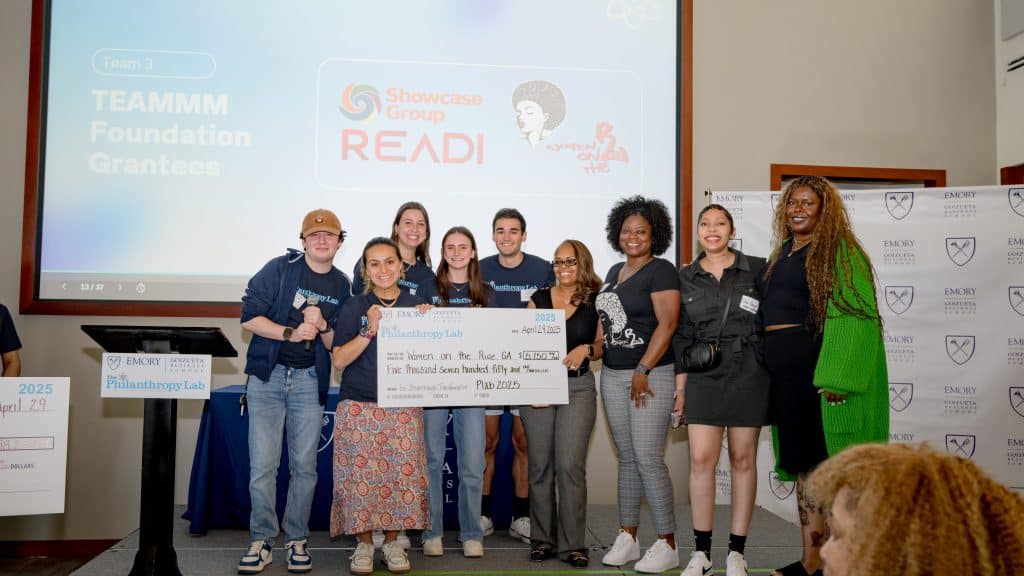
“As a Black woman and organizer, it meant a lot to share space with students who genuinely wanted to understand how community-rooted work moves us closer to collective freedom. We were proud to share our story, reflect on what liberation really looks like, and be part of shaping future leaders who see justice as a shared responsibility. Programs like this show what’s possible when institutions truly connect with community.”
Alvin Glymph, chief community impact officer of United Way was moved as well.
“As an alum of Emory, I was catalyzed as a servant leader on that campus, and seeing current students embrace these values through the Philanthropy Lab literally gave me goosebumps,” says Glymph. “Their careers will be accelerated because at an early stage, they are learning how strategic and equitable philanthropic management ensures efforts are both impactful and sustainable.”

“My experience supporting the Philanthropy Lab was remarkable,” he adds. “The rigor and intentionality displayed by the students in their philanthropic activities was truly inspiring. They clearly understand the importance of their efforts and how they make critical, tangible contributions to local nonprofits.”
For Nemala, the course fundamentally changed her understanding of her hometown.
“Despite growing up in Atlanta for almost 20 years, I feel like I’ve never been able to go this deep on learning about all these amazing causes and nonprofits that exist to remedy these issues,” says Nemala. “It’s been very inspiring to see how many people there are out there looking to directly impact their neighborhoods. It has honestly given me a lot of hope for positive change in Atlanta going forward.”
“Do it Anyway”
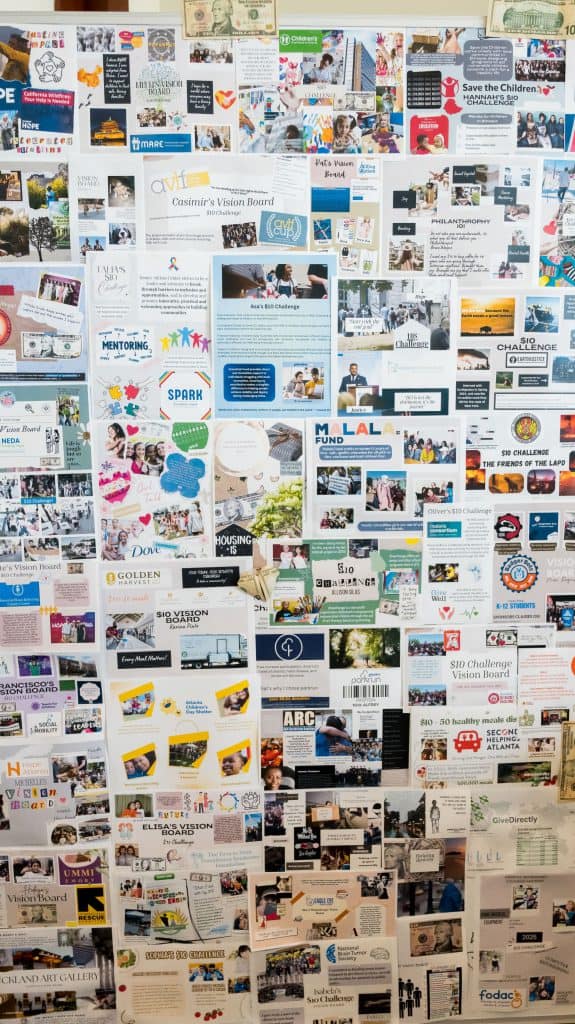
Toward the end of the ceremony, Goebel acknowledged to the crowd that when contemplating the many injustices and ailments in our communities, it’s easy to become overwhelmed and discouraged. In those moments, Goebel encouraged them to remember a quote from Roberto C. Goizueta inscribed on the wall of Goizueta Business School: “The cynics will tell you that the good you do today will be forgotten tomorrow. Just do it anyway.”
“There are maybe more cynics than ever; they’re loud,” says Goebel. “I think of this quote and remember this sentiment. It gives me the courage to keep moving forward, and I trust it inspires our students to do the same. No good actions are truly lost.”
As the DJ queued the next celebratory track and students posed with community partners holding oversized checks, it became clear that the real gift of the Philanthropy Lab wasn’t just financial—it was the lasting relationships, the sharpened perspectives, and the lived experience of learning to lead with both heart and mind.
“As leaders, you lead from the seat that you’re in,” Traylor reminded her students at the event’s conclusion. “You don’t need a title, and you don’t need a bunch of money. The future is yours to shape. You got next.”
2025 class grantees include ChopArt Corporation, College AIM, disABILITY LINK, Dream Builders of Atlanta, Environmental Community Action (Eco-Action), Freedom University, Georgia Advancing Communities Together, Goodr Foundation, Motherhood Beyond Bars, Showcase Group x READI, Southern Women In Motion Foundation, Street Angels, The Aster Project, The Scholarship Academy, Women on the Rise GA.
Read more about how Goizueta’s Business & Society Institute is shaping business for the future.


